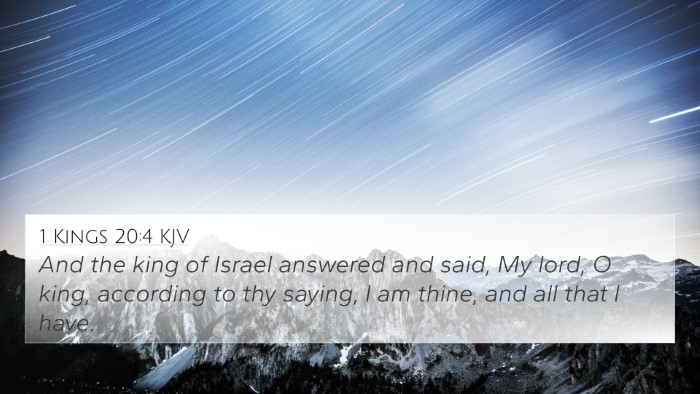Understanding 2 Kings 18:14
In 2 Kings 18:14, we find a crucial moment in the history of Judah during the reign of King Hezekiah. This verse reads:
"And Hezekiah king of Judah sent to the king of Assyria to Lachish, saying, 'I have done wrong; turn from me: that which thou puttest on me will I bear.' And the king of Assyria appointed unto Hezekiah king of Judah three hundred talents of silver and thirty talents of gold."
Context and Background
The historical context of this verse is significant. Hezekiah is dealing with a powerful enemy, the king of Assyria, who is threatening Judah. This period in Jewish history is marked by trials of faith and political struggles. Hezekiah’s appeal to the king of Assyria reflects both his desperation and his recognition of the dire straits Judah has found itself in.
Commentary Insights
-
Matthew Henry's Commentary:
Henry emphasizes the humility of Hezekiah's approach. He recognizes his mistakes and appeals for relief from the Assyrian threat, demonstrating the principle of seeking help in times of trouble. This moment represents a pivotal time where a king's faith is tested against overwhelming odds.
-
Albert Barnes' Notes:
Barnes points out the tactical nature of Hezekiah's plea. The payment demanded by Assyria is steep, suggesting that Hezekiah is trying to buy time and peace for his people. This highlights not only the great fear the Assyrians instilled but also the diplomatic struggles faced by smaller nations against world powers.
-
Adam Clarke's Commentary:
Clarke notes that this tribute demands not just financial strain but indicates a failure in sovereignty. Hezekiah's statement of bearing the burden illustrates the weight of leadership during crisis and the tension of subjugation under a foreign king. This verse is starkly prophetic of the challenges faced by God’s people in reliance on worldly powers.
Bible Verse Cross-References
This verse resonates with several other passages in the Bible, highlighting themes of humility, distress, and the call for help in times of trouble. Here are some of the notable cross-references:
- Isaiah 36:1-3: This passage provides more context on the Assyrian aggression and Hezekiah’s plight.
- 2 Chronicles 32:9-12: Chronicles details more surrounding Hezekiah’s correspondence with Assyria.
- Psalm 18:6: A reflection of calling upon God in distress, illustrating the dependency on divine help.
- Isaiah 37:1-4: Shows the further developments of Hezekiah's reaction to the Assyrian threats.
- 1 Peter 5:7: Emphasizes casting one’s cares upon God, resonating with Hezekiah's humility.
- Matthew 11:28: The invitation to come to Christ for rest can be compared to Hezekiah’s plea for relief.
- Lamentations 3:22-23: The theme of mercy from God during hardships, akin to Hezekiah’s situation.
Connections Between Bible Verses
The themes in 2 Kings 18:14 are connected to broader biblical narratives. Hezekiah's action points to how leaders of God's people often face overwhelming situations, akin to various stories in the Bible where individuals seek divine intervention when surrounded by trials.
Thematic Bible Verse Connections
Several themes emerge from this verse, including:
- Leadership and Responsibility: Hezekiah's duty as a king illustrates the weight of leadership during crises.
- Appeal and Repentance: The call for help embodies a broader spiritual message of turning towards God.
- The Weight of Sin: A recognition of wrongdoing reflects the call to repentance found throughout the scriptures.
Comparative Bible Verse Analysis
Analyzing this verse alongside other scripture can deepen understanding. The interactions between Old Testament figures, such as Hezekiah, and their New Testament counterparts reveal a continuity of faith and reliance on God throughout biblical history.
Conclusion
2 Kings 18:14 serves as a reminder of the importance of humility, reliance on God, and the struggles leaders face. Hezekiah’s response to the Assyrian king serves as a compelling case study for understanding how individuals in the Bible navigated complex moral and spiritual landscapes.
Tools for Bible Cross-Referencing
For those interested in exploring cross-references further, tools such as a Bible concordance or Bible cross-reference guide can provide invaluable resources. These guides allow for deeper study into linking Bible scriptures and finding thematic Bible verse connections effectively.






